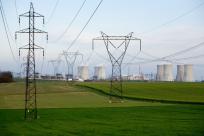
Is Interstate Transmission Really the Answer?May 11, 2010 - Bill Opalka - renewablesbiz.com
It would be easy to fall into the trap of describing opponents of the transmission policy favored by many clean energy organizations and developers as "anti-renewables." After all, there seems to be a widespread belief that wind energy from the nation's heartland could supply electricity to both coasts with minimal losses if the transmission infrastructure was built out.. In theory, that works fine. And while everyone acknowledges the costs would be steep, the perceived and actual benefits are what make for a great debate. A more complicated discussion about the role interstate transmission corridors should play in the build-out of renewable energy projects is gaining steam. The primary objection isn't physics: it's transparency.
About two months ago the Coalition for Fair Transmission Policy was formed, which is a group of investor-owned utilities like CMS Energy Corporation, PSEG, Northeast Utilities, Southern Company and others.
"Especially on the wholesale side, the cost of delivering the product should be included in the economic analysis that takes place when people are trying to decide what types of renewables they should build," said Timothy Fagan, director of public policy for PSEG Services Corporation.
With the transmission build-out costs shared widely across the Eastern Interconnection, there would be no transparency as to the true costs of delivering renewable energy, the coalition maintains.
The argument could gain a higher profile if and when a comprehensive energy bill again comes before the Senate Energy and Natural Resources Committee, an uncertain prospect now with oil gushing into the Gulf of Mexico.
Whatever the case, the argument turns on the simple phrase added to the Senate energy bill last year, the Corker amendment, that transmission cost allocation should be limited to those who enjoy a direct benefit.
Besides the cost and transparency argument, there are other key points in the discussion. Locally based renewable generation, including offshore wind, solar and biomass would be at a competitive disadvantage with Midwestern wind. Another argument is the idea that dirty coal generation from the Midwest would "freeload" onto the new transmission lines due to the intermittent nature of wind generation, which would mean idle capacity would be available to transport electricity to load. Inherently cheaper absent a price on carbon, this energy would displace locally-based clean generation while impacting Eastern air quality, or so the argument goes.
The argument only promises to get more intense, as the energy debate in Congress returns.

|